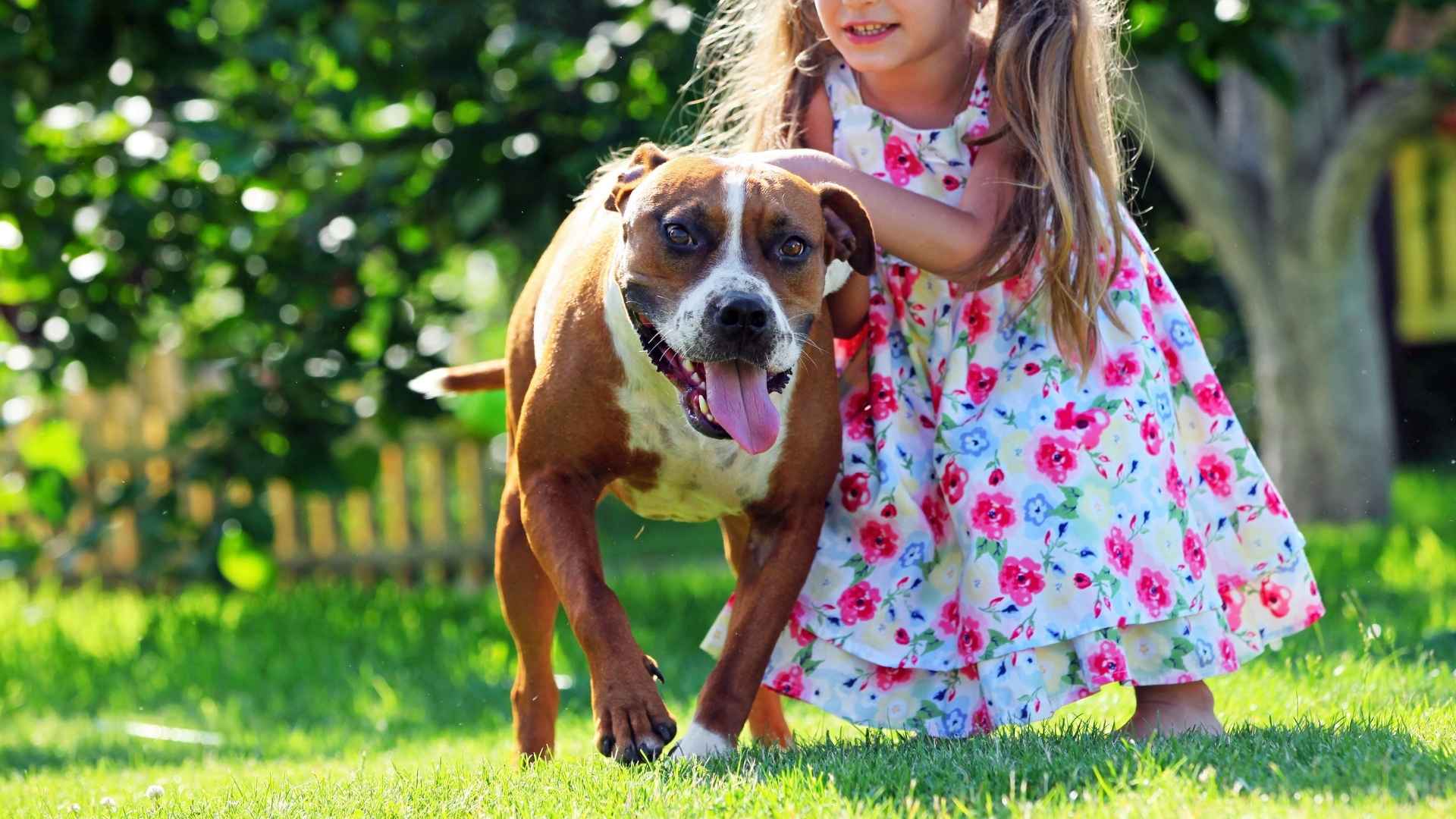When it comes to finding the perfect family dog, especially one that can both protect and get along well with kids, the balance between loyalty and gentleness is key. Not all guard dogs are suited to be left alone with children; they need to be protective yet patient, vigilant but calm.
Families want a furry friend who can provide security without constant supervision, making daily life easier and safer. Whether you’re looking for a watchful guardian that can calmly alert you to strangers or a gentle protector who is patient with playful kids, certain breeds stand out for their unique ability to blend these qualities.
In this article, we’ll explore seven guard dog breeds known for their protective instincts and kid-friendly nature, dogs that can be trusted around children even when parents are momentarily away. Ready to meet your family’s future four-legged hero?
Guard Dog Breeds For Kids That Can Be Left Alone
1. Boxer
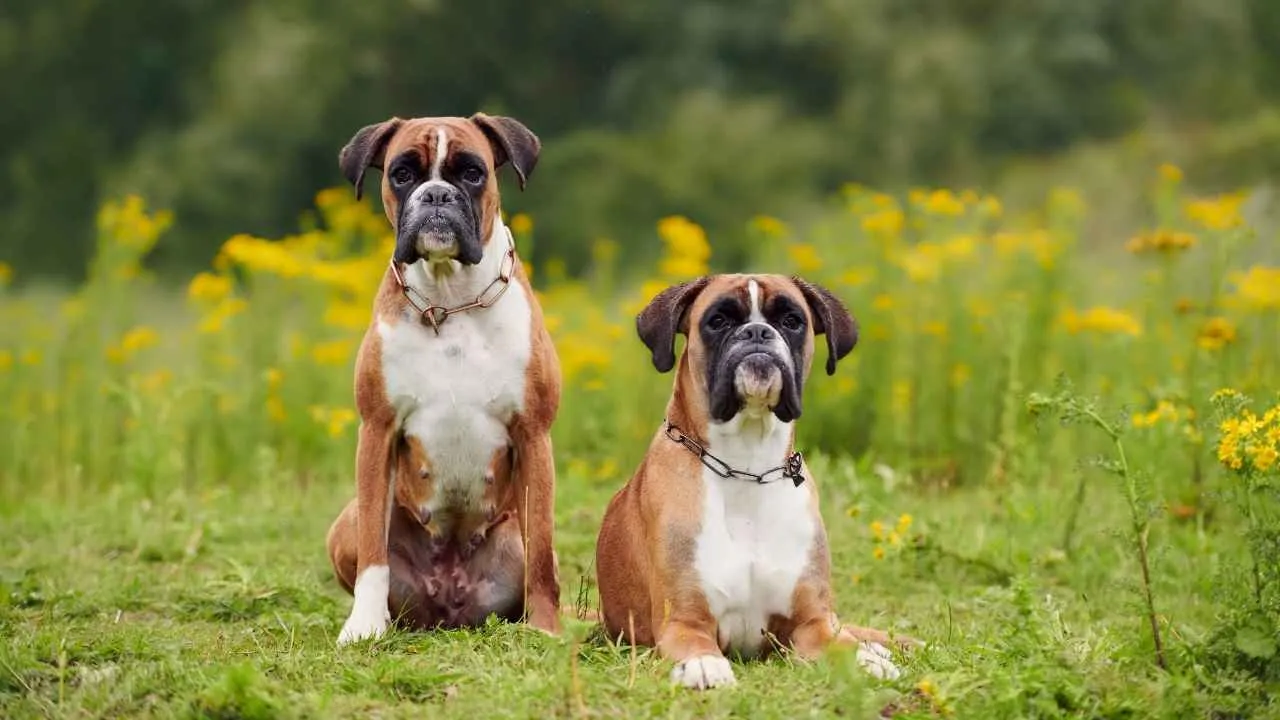
Size: Medium to large
Weight: 50–80 pounds
Temperament: Playful, protective, affectionate, energetic
Boxers are energetic dogs known for their boundless enthusiasm and affectionate nature. They thrive on human companionship and quickly become an inseparable part of the family. Their natural protective instincts make them excellent guard dogs without being overly aggressive.
These dogs have a high level of intelligence and learn commands rapidly, which makes training a rewarding experience. Their playful demeanor makes them wonderful companions for children who enjoy active play and outdoor fun. While energetic, Boxers have a gentle side that shines through in family settings, especially around kids.
Despite their strong build, Boxers are sensitive to harsh training; positive reinforcement methods work best. Their loyalty extends to protecting their home and loved ones, but they usually reserve their alertness for genuine threats. This breed adapts well to families that can provide consistent exercise and mental stimulation.
Boxers require moderate grooming and are relatively low-maintenance in that area. Their short coat is easy to care for and keeps shedding manageable with regular brushing. Due to their playful nature, Boxers excel in family homes where children are present, and they can be left alone safely with kids under reasonable supervision.
Quick Tips
Provide daily exercise to channel their energy positively and prevent boredom.
Use positive training techniques to build trust and encourage good behavior.
2. Staffordshire Bull Terrier
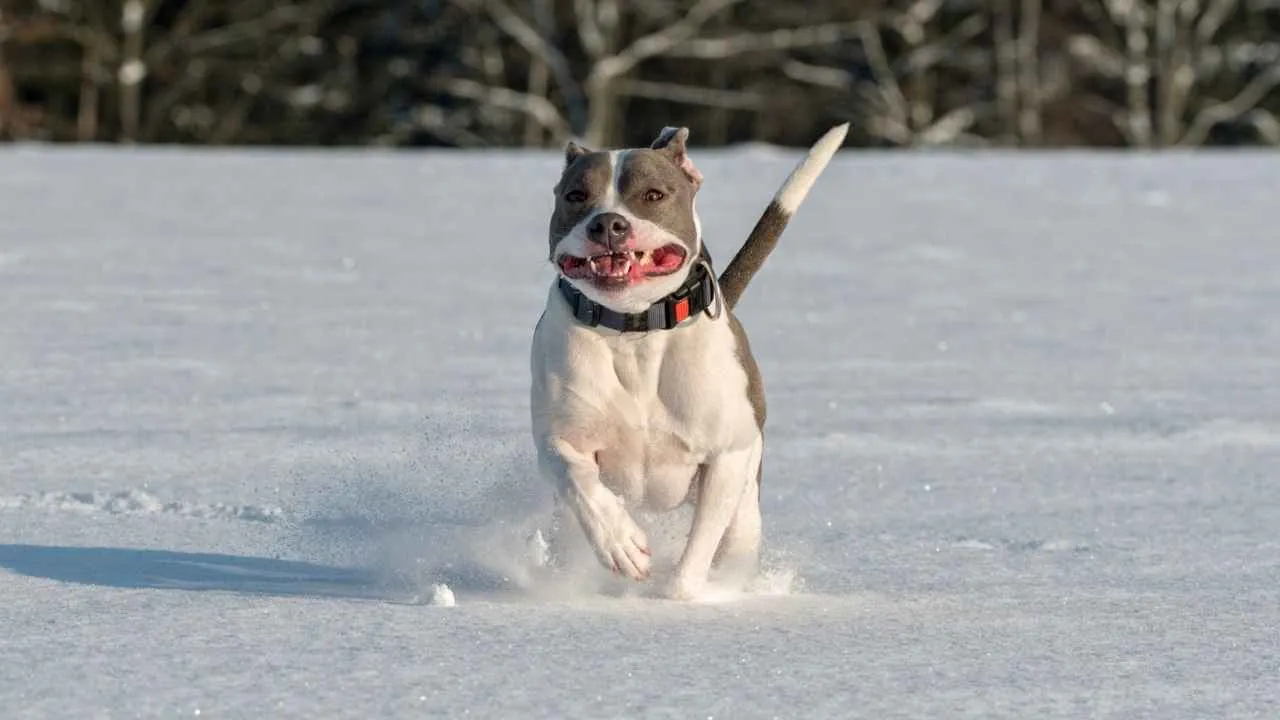
Size: Medium
Weight: 24–38 pounds
Temperament: Loyal, courageous, affectionate, intelligent
Staffordshire Bull Terriers have a strong, muscular build but are surprisingly gentle and patient with children. They are known for their loyalty and tend to form close bonds with family members. Their natural alertness makes them quick to notice unfamiliar situations.
PetMD states that this breed is intelligent and learns commands quickly, especially when training is consistent and positive. They enjoy interactive play and mental challenges that keep their minds sharp. Early socialization is important to help them adjust well to different environments and people.
Despite their energy, Staffordshire Bull Terriers are adaptable to indoor living if they receive daily exercise. Their short coat is easy to maintain and requires only occasional grooming to stay clean and healthy.
Staffies have a playful streak and thrive on affection, often seeking out human companionship. They are fearless protectors but are generally friendly and approachable when properly socialized.
Providing chew toys and puzzle games can help channel their energy constructively. A structured routine with clear rules suits their intelligent and sometimes stubborn nature.
Quick Tips
Start socialization early to build confidence and reduce anxiety.
Keep training consistent and reward-based to maintain cooperation.
3. Rottweiler
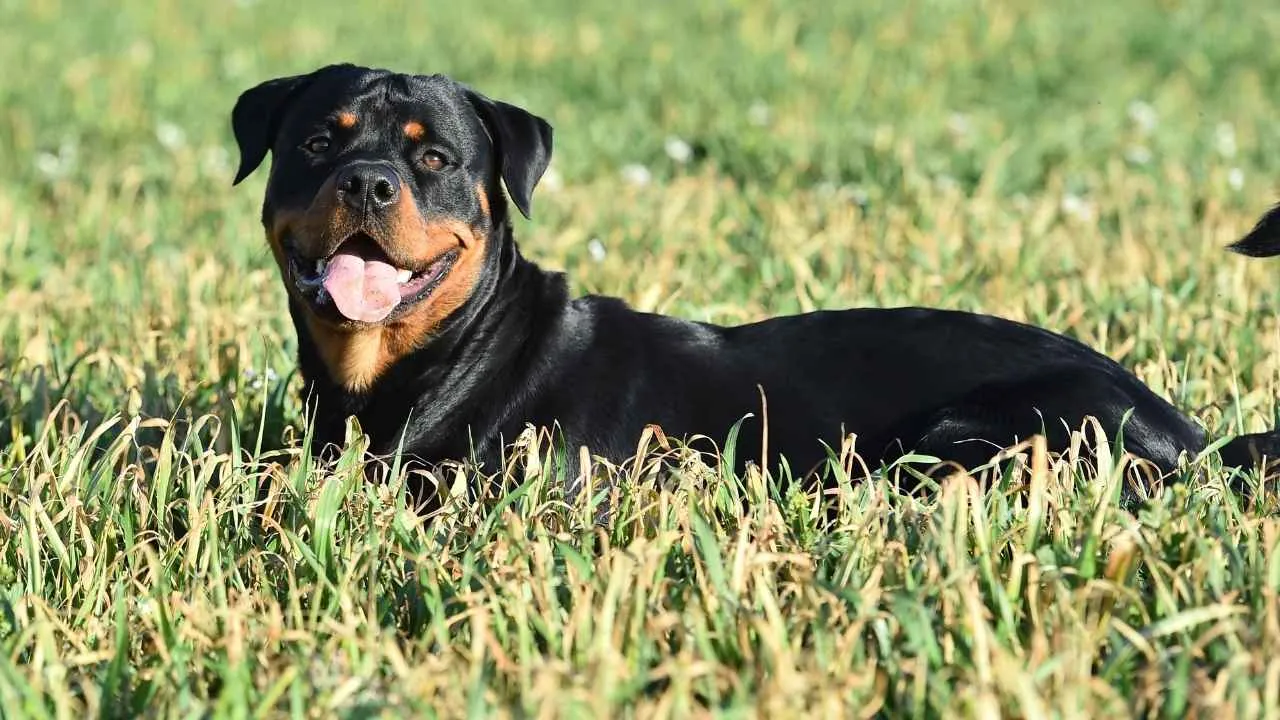
Size: Large
Weight: 80–135 pounds
Temperament: Confident, protective, calm, intelligent
Rottweilers are powerful dogs known for their calm confidence and strong protective instincts. They are naturally alert and make excellent watchdogs, carefully observing their surroundings. Despite their imposing appearance, many are gentle and affectionate within their families.
This breed requires firm, consistent training paired with positive reinforcement to thrive. They are highly intelligent and respond well to challenges that engage their minds. Early socialization is essential to ensure a balanced temperament and prevent territorial behavior.
Rottweilers enjoy physical activities and benefit from daily exercise to maintain their health and manage energy levels. Their short, dense coat is relatively low maintenance but sheds seasonally and needs regular brushing.
While they are naturally protective, Rottweilers can be patient and tolerant with children, especially when raised together. Their loyalty runs deep, making them dependable family guardians.
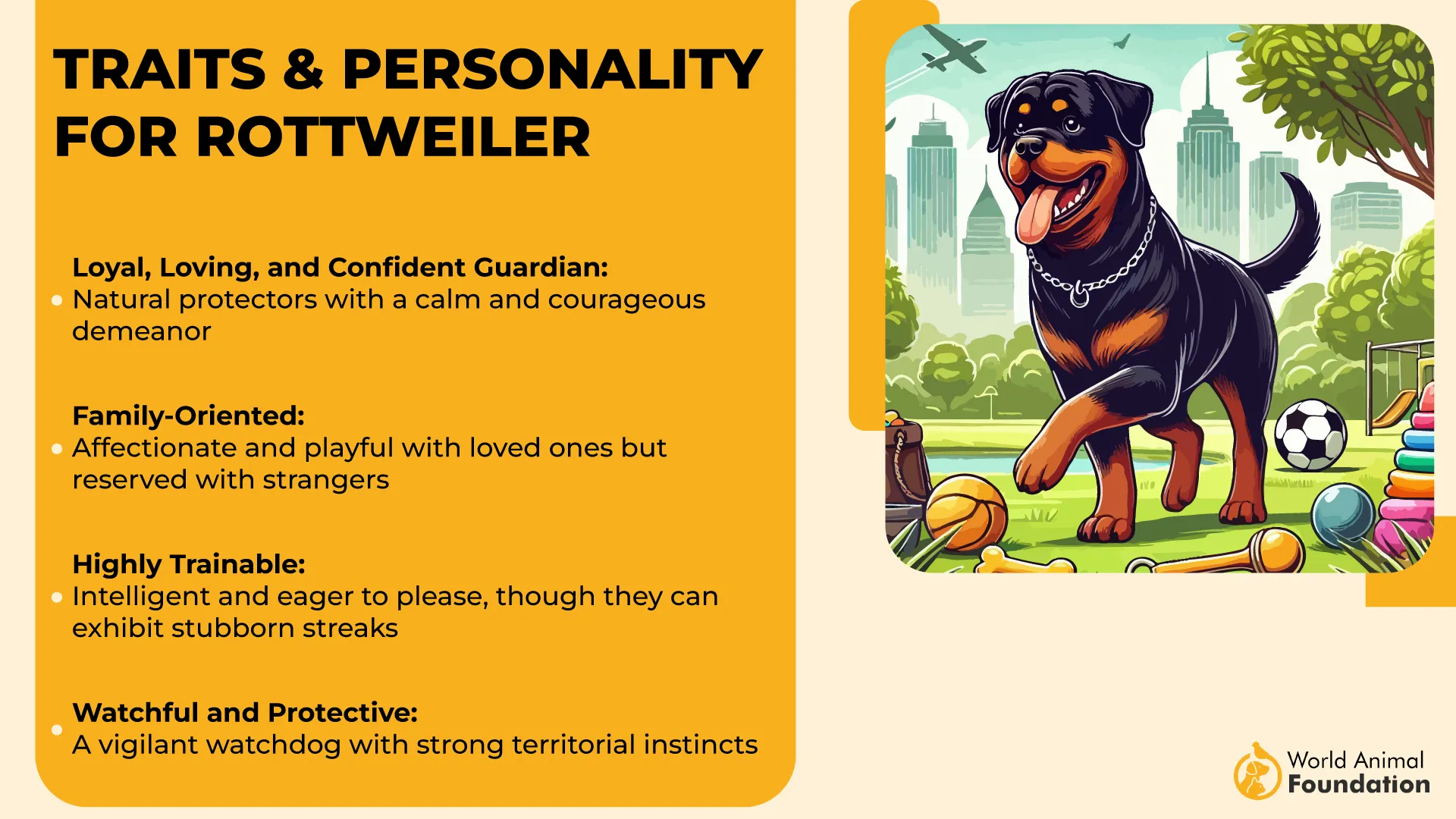
Mental stimulation, like obedience training or puzzle toys, keeps Rottweilers sharp and well-behaved. Structured environments with clear rules help them flourish both as protectors and family companions.
Quick Tips
Prioritize early socialization and obedience training to build a balanced dog.
Provide regular exercise to channel their energy and keep them fit.
4. Doberman Pinscher
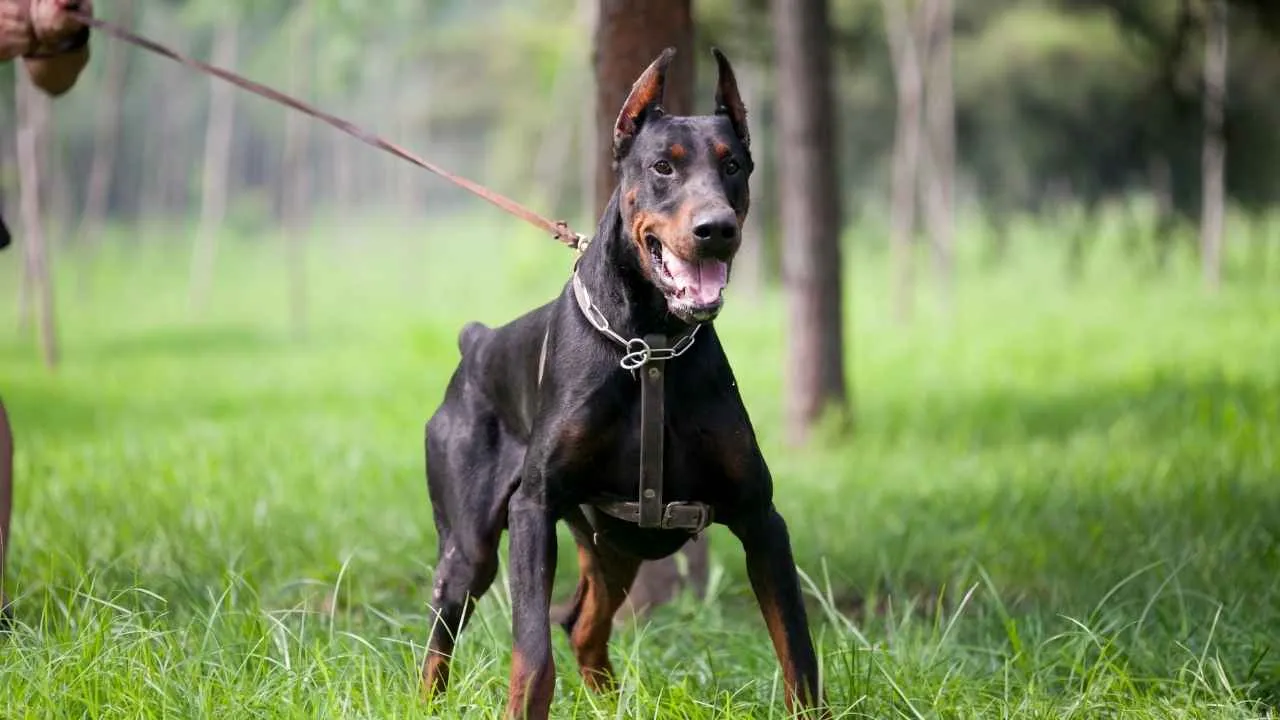
Size: Medium to large
Weight: 60–100 pounds
Temperament: Alert, intelligent, loyal, energetic
Dobermans are highly intelligent dogs, prized for their sharp instincts and quick learning ability. They form strong bonds with their families and are naturally protective without being unnecessarily aggressive. This breed thrives on mental stimulation and thrives with clear, consistent training.
Known for their sleek, athletic build, Dobermans are energetic and require regular exercise to stay balanced. Early socialization is crucial to ensure they remain friendly with children and strangers alike. Despite their protective nature, they often show remarkable patience around kids, especially when raised with them.
According to the AKC, their short coat is low-maintenance, shedding minimally but benefiting from weekly brushing to keep it healthy. Dobermans excel in environments where they have tasks to focus on, such as obedience or agility training. Their vigilance makes them reliable watchdogs who can be trusted to stay calm around family members.
Dobermans require confident handlers who can provide leadership without harshness. When nurtured properly, they can be calm, loving companions who are alert guardians.
Quick Tips
Engage them daily with physical and mental challenges to prevent boredom.
Socialize early to build trust and reduce potential anxiety around strangers.
5. Bullmastiff
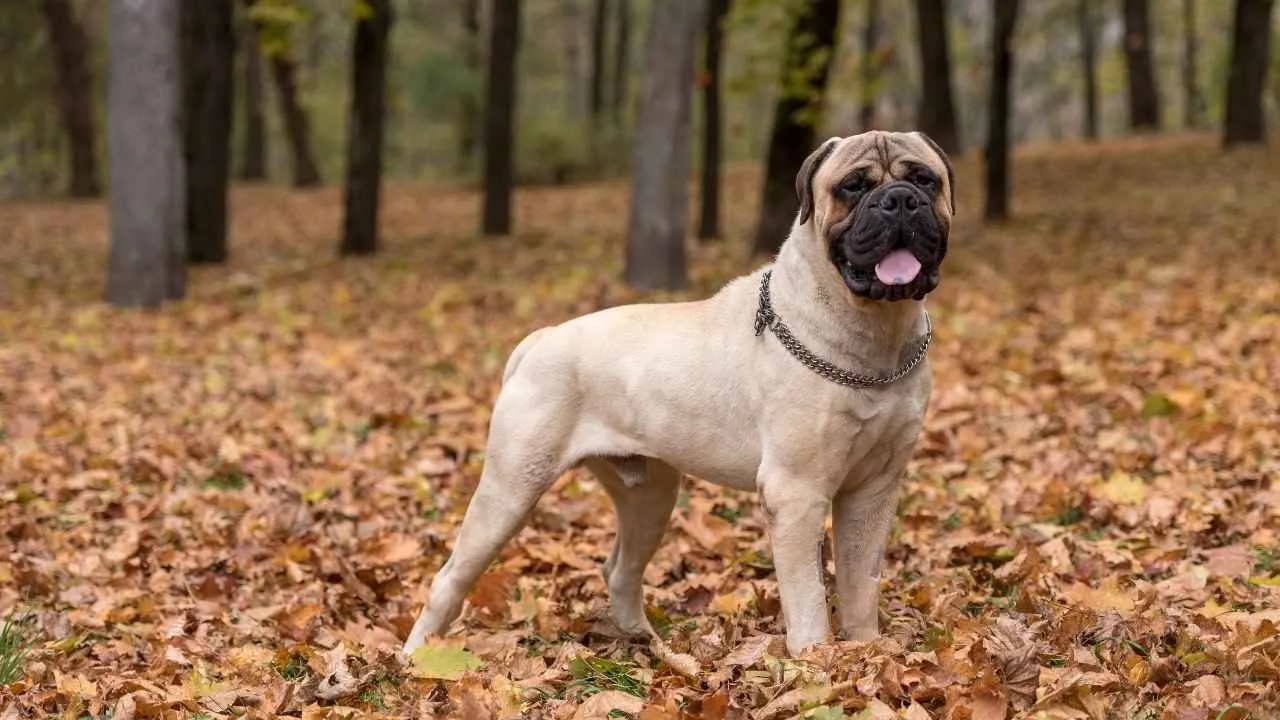
Size: Large
Weight: 100–130 pounds
Temperament: Protective, calm, affectionate, brave
Bullmastiffs have a strong, muscular frame built for protection, but balance it with a calm and affectionate nature. They are natural guardians, originally bred to guard estates without being overly aggressive. Their quiet confidence means they usually only act when a real threat appears.
This breed is known for being gentle with children, showing a patient and nurturing attitude toward family members. Despite their size, Bullmastiffs are surprisingly low-energy indoors and appreciate a relaxed household. They respond well to firm but kind training, as they value clear boundaries.
Regular exercise helps keep Bullmastiffs fit, but they do not require excessive activity to stay healthy. Their short coat is easy to maintain with weekly brushing. Socialization early on ensures they remain composed and well-adjusted in various situations.
Bullmastiffs have a protective instinct that is combined with a gentle temperament, making them trustworthy companions. Their watchful presence alone often deters intruders without the need for aggression.
Quick Tips
Use gentle, consistent training to build trust and respect.
Ensure early socialization to foster calm and confident behavior.
6. Great Dane
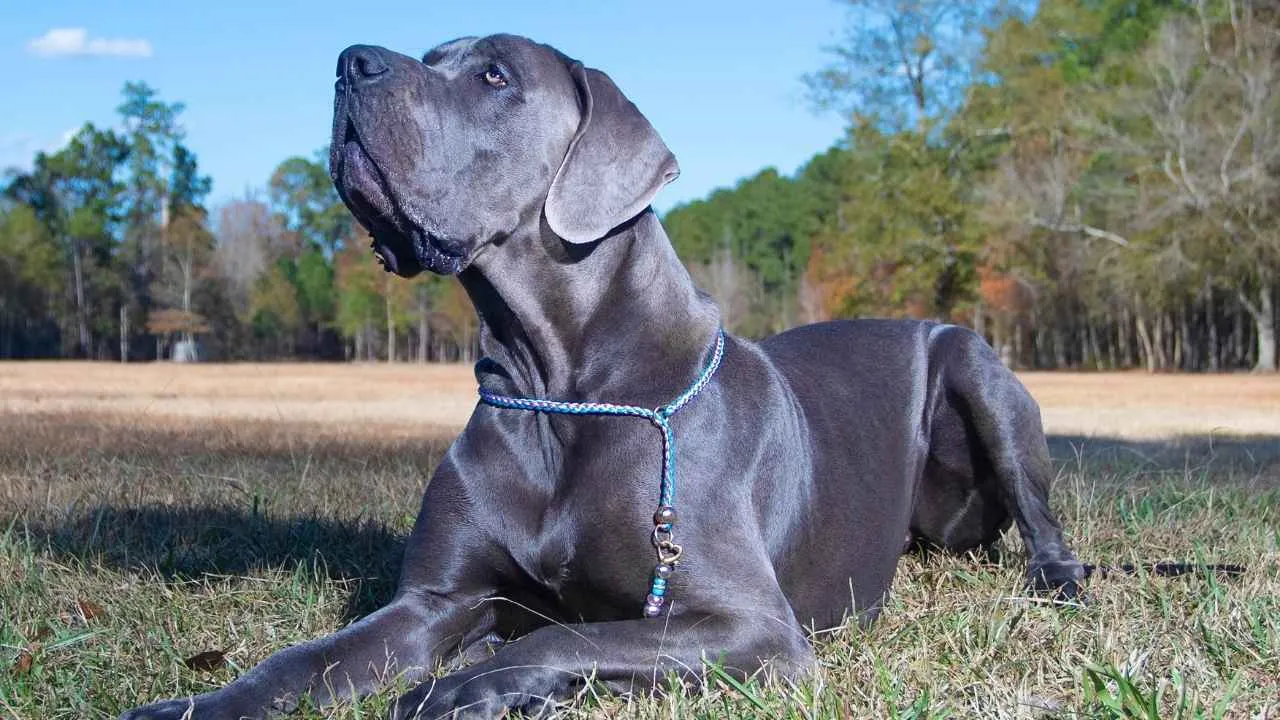
Size: Giant
Weight: 110–175 pounds
Temperament: Gentle, friendly, calm, alert
Great Danes are famous for their enormous size paired with a surprisingly gentle demeanor. Despite their imposing stature, they are affectionate and patient with children, often referred to as “gentle giants.” Their calm nature makes them excellent family companions.
As per PetMD, this breed is naturally alert and protective, though they are not known to be aggressive. They rely more on their presence and deep bark to deter strangers than on physical confrontation. Great Danes require moderate exercise but enjoy lounging with the family as much as playing outside.
Their short coat is easy to care for, requiring minimal grooming to keep them clean and comfortable. Because of their size, they need space to move comfortably, but adapt well to indoor living with enough room.
Great Danes benefit from early socialization and consistent training to foster good manners and confidence around strangers and children. Their loyalty and mild temperament make them ideal for families seeking a calm yet watchful guardian.
Despite their size, Great Danes have a playful side and enjoy engaging with children in gentle play. Their protective instincts are balanced by a kind and tolerant personality.
Quick Tips
Provide daily moderate exercise to support joint health and prevent obesity.
Begin socialization early to build confidence and reduce shyness.
7. German Shepherd
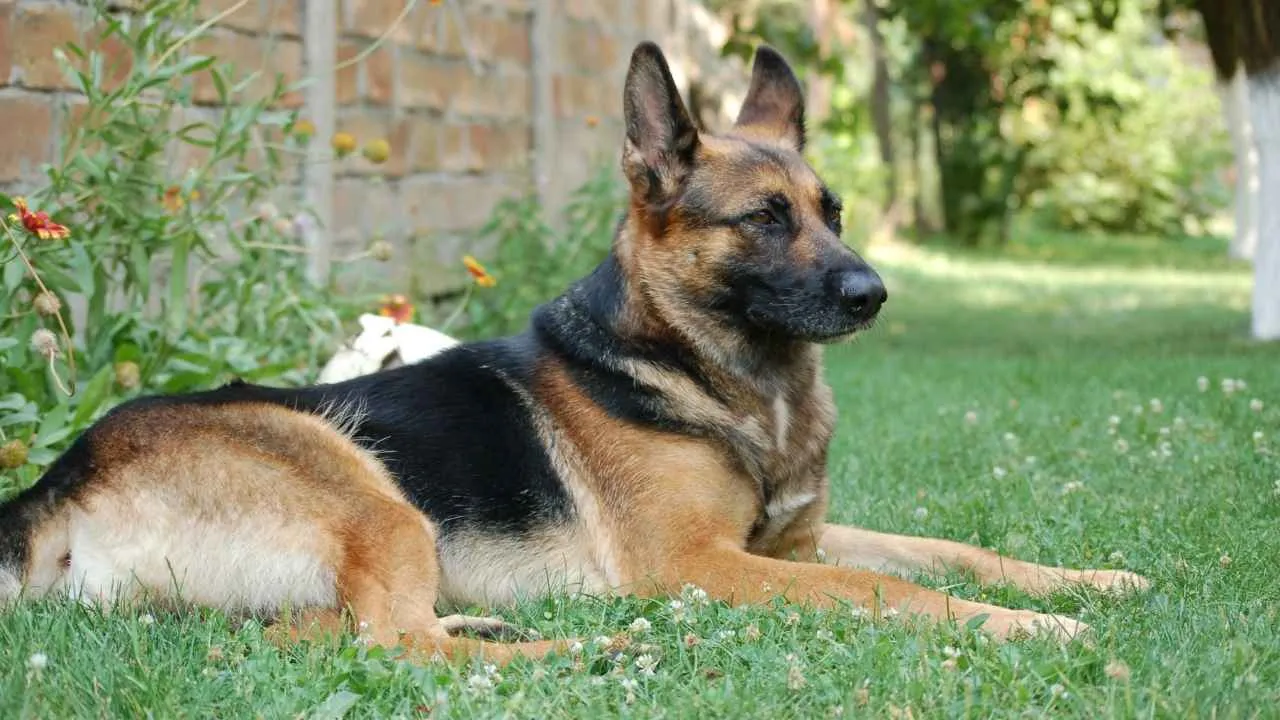
Size: Large
Weight: 65–90 pounds
Temperament: Intelligent, loyal, protective, confident
German Shepherds are renowned for their intelligence and strong protective instincts. They combine courage with loyalty, making them one of the most versatile guard dogs around. Their confidence and attentiveness help them detect potential threats quickly.
This breed requires regular mental and physical exercise to stay balanced and focused. German Shepherds thrive in environments where they have clear structure and purpose, responding well to consistent training. Their adaptability allows them to work well both as family pets and protectors.
Known for their strong bond with family, German Shepherds can be patient and gentle with children when properly socialized. Their eagerness to please often results in obedient and trustworthy behavior.
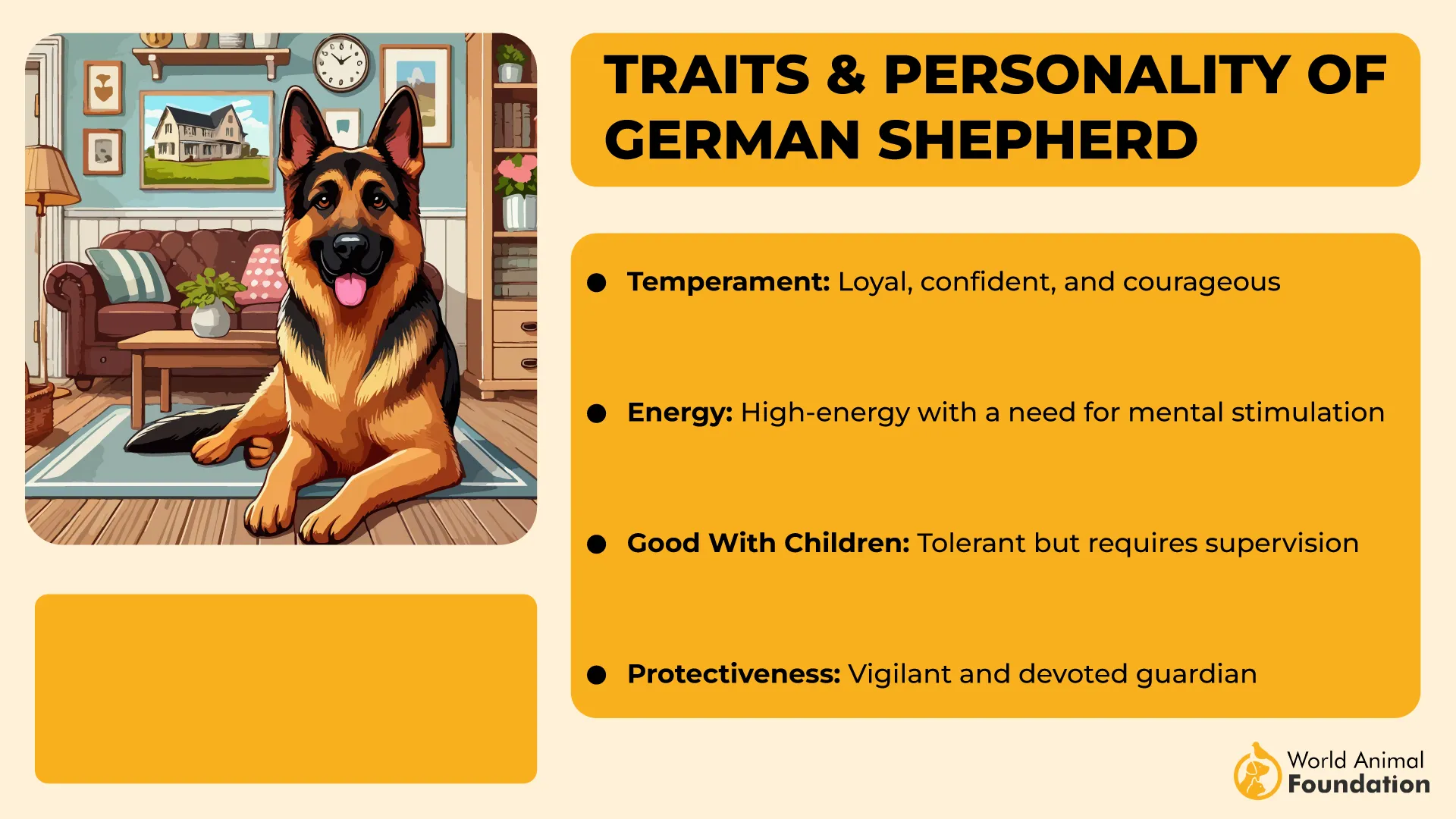
Their double coat needs regular grooming to manage shedding and keep their fur healthy. This breed benefits from early socialization to reduce potential wariness of strangers and promote a calm demeanor.
German Shepherds have a natural guarding instinct but also a friendly side that shines in family interactions. They require committed owners who can provide leadership and engagement.
Quick Tips
Invest time in training and mental stimulation to keep them sharp.
Socialize from an early age to encourage well-rounded behavior.
Conclusion
Choosing the best guard dog breed for your family means balancing protection with a gentle nature, especially around children. Family guard dogs like Boxers, Staffordshire Bull Terriers, and German Shepherds offer loyalty and vigilance without excessive barking or aggression. These breeds thrive with plenty of exercise and early training, responding well to basic commands.
First-time dog owners should focus on proper training and socialization from a young age to bring out the best qualities in their companion. Often called “nanny dogs,” many have a natural instinct to protect and nurture children, making them ideal for families with kids of all ages. Whether you live in a big house or a smaller space, the right dog can help deter intruders and boost home security while fitting smoothly into family life.
For those seeking a working dog with dedication, these breeds can excel in protection training or military work with the right guidance. While small dogs may bark excessively, these guard breeds usually remain calm when properly trained.
Choosing a dog that fits your lifestyle, offers reliable protection, and enjoys family time ensures a loyal friend who will wag their tail happily while keeping your loved ones safe.


